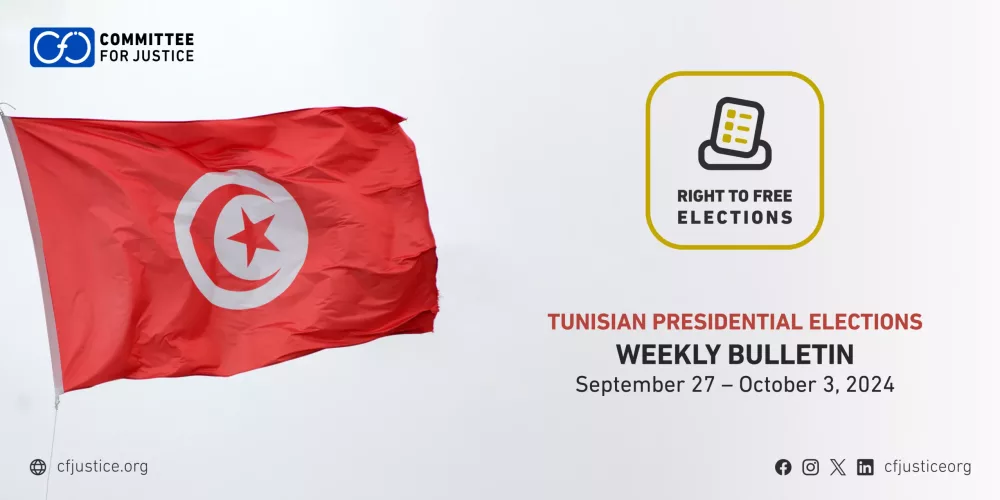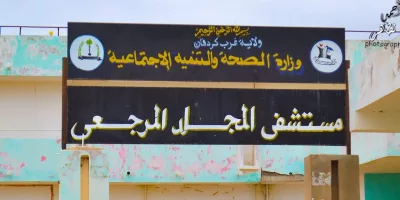As part of its continuous follow-up on the 2024 Tunisian presidential elections, the Committee for Justice (CFJ) has released its weekly bulletin covering the period from September 27 to October 3, 2024. The bulletin focused on the most prominent developments related to the electoral process, including legal and human rights violations, challenges faced by candidates, and the impact of decisions made by authorities on the fairness of the elections. This bulletin comes amid a politically charged atmosphere and rising criticism of government interference in the election process.
– Rejection of amendments to the electoral law:
This period witnessed significant controversy surrounding the amendment of the Tunisian electoral law by the parliament, which was ratified despite major objections. The parliament approved the revision on September 27, 2024, a controversial amendment criticized by the Supreme Judicial Council, which argued that the changes contradict recognized legal principles, especially concerning the ongoing elections.
Law students at the Faculty of Law in Sfax boycotted lectures in protest of the amendments, considering them a blow to trust in the electoral process. Tunisian law and political experts viewed the ratification of the amendment during this period as a blatant violation of international principles guaranteeing electoral integrity, warning that this change threatens legal security and the stability of the electoral system.
– Banning of election monitoring associations:
One of the main topics highlighted in the bulletin was the decision of the Independent High Electoral Authority not to grant some organizations, such as the “Observers Network,” accreditation to monitor the elections. This decision was legally challenged by the organization, which deemed the ban an obstacle to electoral transparency.
Meanwhile, the Independent High Electoral Authority continued to monitor media outlets covering the elections, noting several violations related to unbalanced coverage and breaches of media neutrality. Warnings were issued to some media outlets, and some violations were referred to the Public Prosecution.
– Ongoing Judicial and Media Harassment:
The bulletin also highlighted the ongoing judicial harassment faced by several candidates and politicians, most notably Lotfi Al-Maraihi, whose sentence was reduced from 8 months to 6 months after being accused of forming a coalition for money laundering. Another candidate, Abdel Latif Al-Makki, was subjected to an investigation by security forces under mysterious circumstances.
Additionally, candidate Ayachi Zammal faces a 12-year prison sentence for charges related to falsifying endorsements and illegally using personal data.
– Calls to boycott the elections:
This period also saw increasing calls for an election boycott from six political parties, namely: the “Democratic Work Party,” “Freedom,” “The Pole,” “The Social Democratic Path,” “The Workers’ Party,” and the “Socialist Party.” These parties urged citizens to refrain from voting in the elections scheduled for October 6, 2024.
These parties argued that the current elections lack constitutional and popular legitimacy, and that the current electoral process represents a continuation of what they described as authoritarianism and marginalization. The parties stressed the importance of uniting democratic forces to oppose this electoral path and called for building a new Tunisia based on true democracy. This stance was also supported by the “Free Constitutional Party” and the “Republican Party.”
– Lack of enthusiasm in the election campaign:
Monitoring associations such as “Youth Without Borders” and the “Tunisian Mediterranean Center” pointed to the absence of the energy and dynamism that characterized previous election campaigns, attributing this to the lack of public funding and the limited resources available to candidates, in addition to restrictions on electoral spending.
These associations also observed that many electoral activities were not publicly announced in advance, and that candidate posters had been vandalized in various locations.
Additionally, the “I Watch” organization warned of ongoing legal violations, emphasizing that these violations could lead to elections lacking legitimacy, thereby casting doubt on the credibility of the election results.






